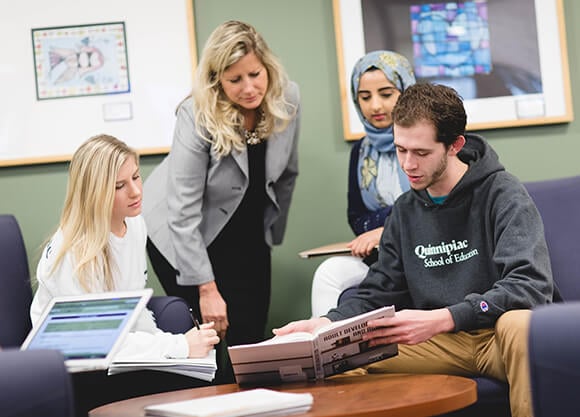
Preparing for college in high school
October 06, 2022

October 06, 2022

Right now, you may feel like tuning out your teachers and guidance counselors when subjects such as college applications, financial aid and university tours come up, but with proper guidance and resources, early preparation doesn’t have to be so daunting.
Universities like Quinnipiac are committed to their students even before they commit to a college. This means that resources specifically designed for high schoolers are readily available to make the transition process smoother and make planning for your academic future exciting rather than stressful. While many college prep courses in high school focus on the application process, future college students are often more concerned about adjusting to the new academic structure without falling behind, struggling in particular courses or losing focus. We understand these concerns and have compiled a list of helpful tips that will guarantee you success as you move forward in your college career.
Take classes that both coincide with and challenge your current skillset. Classes that you may not have initially considered may very well ignite a passion that you were previously unaware of. For now, consider advanced-level courses in high school that could potentially result in college credit. This can get you ahead in your college track and even allow you to graduate early.
Get involved with extracurricular activities. Most universities have an abundance of clubs and organizations, so you are bound to find a group that matches your passion or one that expands your existing interests. If you can’t find what you are looking for, be ambitious and start your own student organization. Joining a student organization or starting your own will also make acclimating to your college culture a bit smoother. Extracurriculars allow you to find people you relate to, even in a brand-new environment. This is the key to making friends and connections.
Maintain relationships with professors, internship coordinators and other influential individuals. Investing in your academic relationships will help you succeed as a student, as bonding with your professors will ensure that they will support you throughout your college experience. As you get closer to graduating, these are the individuals that will write you valuable letters of recommendation for potential employers as well.
Get as much professional experience as early as possible. Seek out volunteer opportunities and internships and step out of your comfort zone as you work to identify your career path. Learn what you’re good at, but more importantly, learn what you love to do. If you can’t find any interesting opportunities on your own, reach out to your guidance counselor for some recommendations.
Keep an ongoing list of your experiences, potential schools or career paths that cater to your interests.
Practice your notetaking and develop healthy study habits. Learning how to stay organized before you transition to college will undoubtedly help you navigate a more flexible (and sometimes hectic) day-to-day schedule.
Identify what kind of learner you are. Do you learn by doing? Do you prefer to observe or read? Your professors and counselors often offer options for how they deliver content to students.
When looking at colleges, think about more than just available topics of study. Make sure the environment is a place you feel inspired and welcomed. Explore the opportunities that will be available to you. And most of all, find a place where you can be yourself.
Quinnipiac Today is your source for what's happening throughout #BobcatNation. Sign up for our weekly email newsletter to be among the first to know about news, events and members of our Bobcat family who are making a positive difference in our world.
Sign Up Now